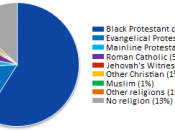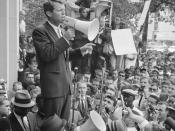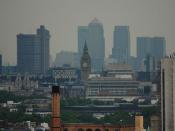Bigger's point of view is used throughout the novel as the narrative is centered on Bigger's life. Wright frequently travels into Bigger's mind, begging with Bigger's journey to the pool hall when he contemplates the potential job option of working at the Dalton's. He also voices the feelings of oppression that he has felt at the hands of a white dominated society that becomes the barrio between him and his dreams. Bigger's fear and hatred of whites is shown in the aborted attempt to rob a white owned store, representing Bigger's general interaction with the whites. In addition, Wright shows Bigger's sense of liberty after he kills Mary, marking his departure from the rest of the black population. The novel then shifts to Bigger's fear and despair as the manhunt for him slowly closes in on his hiding place. The narrative concludes with the beginning of Bigger's reconciliation of his attitude towards whites with their perception of him.
The point of view of the black community is also expressed in the figures of Bessie and Bigger's mother. Bigger's mother is introduced in the opening scene following the rat chase, commenting on Bigger's laziness and her recommendation to make the greatest attempt to prosper despite white domination. She returns to the end of the novel by visiting Bigger in jail and offering the only hope to racial conflict through religion. Bessie is present throughout Bigger's attempt to escape from the white mob that is tracking him.
The white community's point of view is present in the Daltons, the white investigator, and the general voice of the public. The Daltons' condescension is depicted in the delegation of jobs to Bigger as well as their attempts to help African Americans through pool tables. In addition, Mary's desire to understand Bigger is further offensive...


